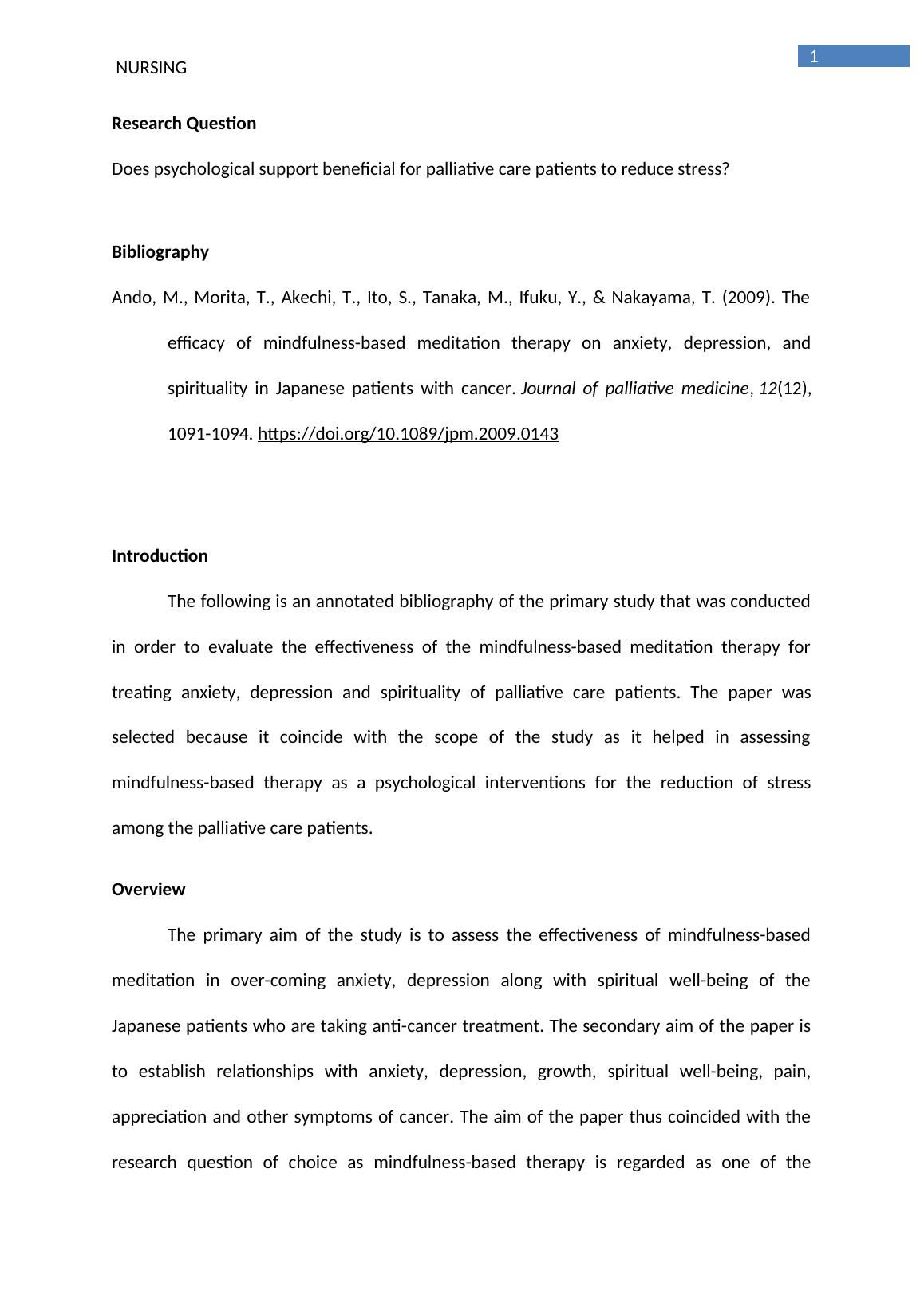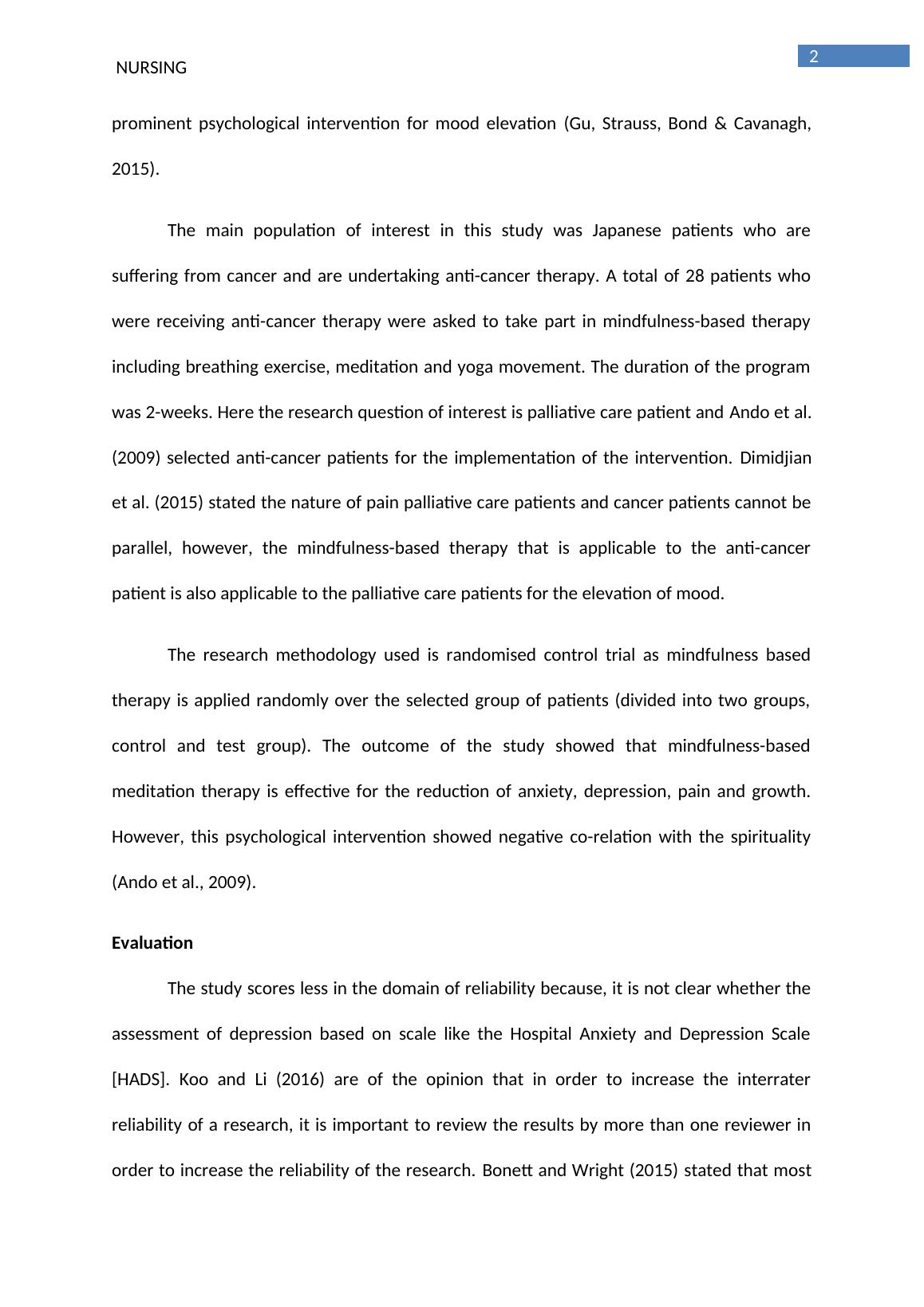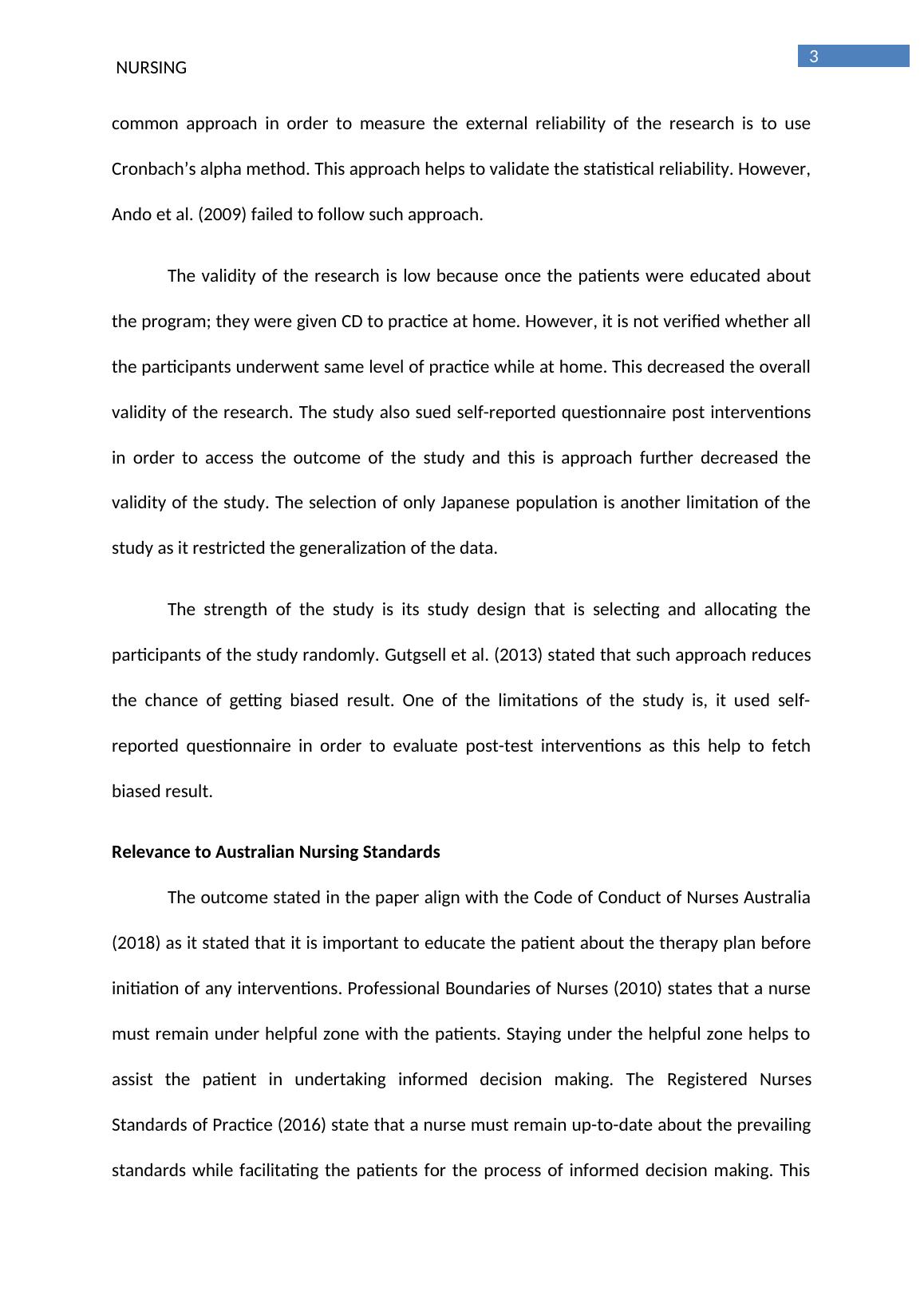Psychological Support for Palliative Care Patients: An Annotated Bibliography
Added on 2022-10-14
13 Pages2540 Words219 Views
Running head: NURSING
Nursing
Name of the Student
Name of the University
Author Note
Nursing
Name of the Student
Name of the University
Author Note

1NURSING
Research Question
Does psychological support beneficial for palliative care patients to reduce
stress?
Bibliography
Ando, M., Morita, T., Akechi, T., Ito, S., Tanaka, M., Ifuku, Y., & Nakayama,
T. (2009). The efficacy of mindfulness-based meditation therapy on
anxiety, depression, and spirituality in Japanese patients with
cancer.
Journal of palliative medicine,
12(12), 1091-1094.
https://doi.org/10.1089/jpm.2009.0143
Introduction
The following is an annotated bibliography of the primary study that
was conducted in order to evaluate the effectiveness of the mindfulness-
based meditation therapy for treating anxiety, depression and spirituality
of palliative care patients. The paper was selected because it coincide
with the scope of the study as it helped in assessing mindfulness-based
therapy as a psychological interventions for the reduction of stress among
the palliative care patients.
Overview
The primary aim of the study is to assess the effectiveness of
mindfulness-based meditation in over-coming anxiety, depression along
with spiritual well-being of the Japanese patients who are taking anti-
cancer treatment. The secondary aim of the paper is to establish
Research Question
Does psychological support beneficial for palliative care patients to reduce
stress?
Bibliography
Ando, M., Morita, T., Akechi, T., Ito, S., Tanaka, M., Ifuku, Y., & Nakayama,
T. (2009). The efficacy of mindfulness-based meditation therapy on
anxiety, depression, and spirituality in Japanese patients with
cancer.
Journal of palliative medicine,
12(12), 1091-1094.
https://doi.org/10.1089/jpm.2009.0143
Introduction
The following is an annotated bibliography of the primary study that
was conducted in order to evaluate the effectiveness of the mindfulness-
based meditation therapy for treating anxiety, depression and spirituality
of palliative care patients. The paper was selected because it coincide
with the scope of the study as it helped in assessing mindfulness-based
therapy as a psychological interventions for the reduction of stress among
the palliative care patients.
Overview
The primary aim of the study is to assess the effectiveness of
mindfulness-based meditation in over-coming anxiety, depression along
with spiritual well-being of the Japanese patients who are taking anti-
cancer treatment. The secondary aim of the paper is to establish

2NURSING
relationships with anxiety, depression, growth, spiritual well-being, pain,
appreciation and other symptoms of cancer. The aim of the paper thus
coincided with the research question of choice as mindfulness-based
therapy is regarded as one of the prominent psychological intervention for
mood elevation (Gu, Strauss, Bond & Cavanagh, 2015).
The main population of interest in this study was Japanese patients
who are suffering from cancer and are undertaking anti-cancer therapy. A
total of 28 patients who were receiving anti-cancer therapy were asked to
take part in mindfulness-based therapy including breathing exercise,
meditation and yoga movement. The duration of the program was 2-
weeks. Here the research question of interest is palliative care patient and
Ando et al. (2009) selected anti-cancer patients for the implementation of
the intervention. Dimidjian et al. (2015) stated the nature of pain
palliative care patients and cancer patients cannot be parallel, however,
the mindfulness-based therapy that is applicable to the anti-cancer
patient is also applicable to the palliative care patients for the elevation of
mood.
The research methodology used is randomised control trial as
mindfulness based therapy is applied randomly over the selected group of
patients (divided into two groups, control and test group). The outcome of
the study showed that mindfulness-based meditation therapy is effective
for the reduction of anxiety, depression, pain and growth. However, this
psychological intervention showed negative co-relation with the
spirituality (Ando et al., 2009).
relationships with anxiety, depression, growth, spiritual well-being, pain,
appreciation and other symptoms of cancer. The aim of the paper thus
coincided with the research question of choice as mindfulness-based
therapy is regarded as one of the prominent psychological intervention for
mood elevation (Gu, Strauss, Bond & Cavanagh, 2015).
The main population of interest in this study was Japanese patients
who are suffering from cancer and are undertaking anti-cancer therapy. A
total of 28 patients who were receiving anti-cancer therapy were asked to
take part in mindfulness-based therapy including breathing exercise,
meditation and yoga movement. The duration of the program was 2-
weeks. Here the research question of interest is palliative care patient and
Ando et al. (2009) selected anti-cancer patients for the implementation of
the intervention. Dimidjian et al. (2015) stated the nature of pain
palliative care patients and cancer patients cannot be parallel, however,
the mindfulness-based therapy that is applicable to the anti-cancer
patient is also applicable to the palliative care patients for the elevation of
mood.
The research methodology used is randomised control trial as
mindfulness based therapy is applied randomly over the selected group of
patients (divided into two groups, control and test group). The outcome of
the study showed that mindfulness-based meditation therapy is effective
for the reduction of anxiety, depression, pain and growth. However, this
psychological intervention showed negative co-relation with the
spirituality (Ando et al., 2009).

3NURSING
Evaluation
The study scores less in the domain of reliability because, it is not
clear whether the assessment of depression based on scale like the
Hospital Anxiety and Depression Scale [HADS]. Koo and Li (2016) are of
the opinion that in order to increase the interrater reliability of a research,
it is important to review the results by more than one reviewer in order to
increase the reliability of the research. Bonett and Wright (2015) stated
that most common approach in order to measure the external reliability of
the research is to use Cronbach’s alpha method. This approach helps to
validate the statistical reliability. However, Ando et al. (2009) failed to
follow such approach.
The validity of the research is low because once the patients were
educated about the program; they were given CD to practice at home.
However, it is not verified whether all the participants underwent same
level of practice while at home. This decreased the overall validity of the
research. The study also sued self-reported questionnaire post
interventions in order to access the outcome of the study and this is
approach further decreased the validity of the study. The selection of only
Japanese population is another limitation of the study as it restricted the
generalization of the data.
The strength of the study is its study design that is selecting and
allocating the participants of the study randomly. Gutgsell et al. (2013)
stated that such approach reduces the chance of getting biased result.
One of the limitations of the study is, it used self-reported questionnaire in
Evaluation
The study scores less in the domain of reliability because, it is not
clear whether the assessment of depression based on scale like the
Hospital Anxiety and Depression Scale [HADS]. Koo and Li (2016) are of
the opinion that in order to increase the interrater reliability of a research,
it is important to review the results by more than one reviewer in order to
increase the reliability of the research. Bonett and Wright (2015) stated
that most common approach in order to measure the external reliability of
the research is to use Cronbach’s alpha method. This approach helps to
validate the statistical reliability. However, Ando et al. (2009) failed to
follow such approach.
The validity of the research is low because once the patients were
educated about the program; they were given CD to practice at home.
However, it is not verified whether all the participants underwent same
level of practice while at home. This decreased the overall validity of the
research. The study also sued self-reported questionnaire post
interventions in order to access the outcome of the study and this is
approach further decreased the validity of the study. The selection of only
Japanese population is another limitation of the study as it restricted the
generalization of the data.
The strength of the study is its study design that is selecting and
allocating the participants of the study randomly. Gutgsell et al. (2013)
stated that such approach reduces the chance of getting biased result.
One of the limitations of the study is, it used self-reported questionnaire in

End of preview
Want to access all the pages? Upload your documents or become a member.
Related Documents
Assignment on Critical Review and Analysis of Three Mind-body Therapieslg...
|8
|1904
|96
Article Analysis for Health Care Patientslg...
|4
|1239
|74
Evidence Based Nursing Research: Yoga in Cancerlg...
|15
|3854
|359
Holistic Care in Palliative Care: Understanding Patients' Needslg...
|5
|1359
|200
Music therapy in palliative care: A randomized controlled trial to evaluate effects on relaxationlg...
|13
|2361
|95
Mindfulness-Based Therapy for Individuals with Mental Health Abnormalitieslg...
|6
|1153
|422
